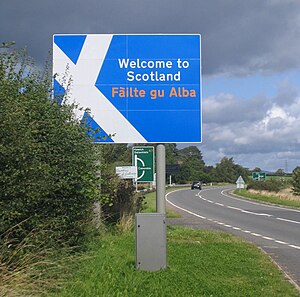Alba

Alba is the Scottish Gaelic name (pronounced [ˈalˠ̪apə]) for Scotland. It is cognate to Alba in Irish and Nalbin in Manx, the other Goidelic Insular Celtic language, as well as similar words in the Brythonic Insular Celtic languages of Cornish (Alban) and Welsh (Yr Alban) also meaning Scotland.
Etymology
The term first appears in classical texts as Ἂλβιον or Αλουίων (in Ptolemy's writings), later as Albion in Latin documents. Historically, the term refers to Britain as a whole and is ultimately based on the Indo-European root for "white".[1] Roughly by the ninth or tenth centuries, it came to be used in the form of Alba (dative Albainn, genitive Albann, now obsolete) by Gaelic speakers as the name given to the kingdoms of the Picts north of the Firth of Forth and the Firth of Clyde, traditionally regarded to have been conquered by Kenneth MacAlpin. The region Breadalbane (Bràghad Albainn, the upper part of "Alba") takes its name from it as well.
As time passed that kingdom incorporated others to the southern territories. It became re-Latinized in the High Medieval period as "Albania" (it is unclear whether it may ultimately share the same etymon as the modern Albania). This latter word was employed mainly by Celto-Latin writers, and most famously by Geoffrey of Monmouth. It was this word which passed into Middle English as Albany, although very rarely was this used for the Kingdom of Scotland, but rather for the notional Duchy of Albany. From the latter the capital of the U.S. state of New York, Albany, takes its name.
Modern uses

Michel Roger Lafosse who claims the Scottish throne, has styled himself as "HRH Prince Michael James Alexander Stewart, 7th Count of Albany" since 1978.
Runrig recorded a song called Alba on their album, The Cutter And The Clan.
In the mid-1990s, the Celtic League started a campaign to have the word "Alba" on the Scottish football and rugby tops. Since 2005, the SFA have supported the use of Scots Gaelic by adding Alba on the back of the official team strip.[2] However, the SRU is still being lobbied to have "Alba" on the national rugby strip.[3][4]
A satellite television channel aimed at the Scottish Gaelic community, BBC Alba, was launched in September 2008 and is a joint venture between MG Alba and the BBC.
A new welcome sign on the historic A7 route into Scotland was erected in 2009, with the text Fàilte gu Alba.
References
- ^ MacBain, A An Etymological Dictionary of the Gaelic Language Gairm 1896, reprinted 1982 ISBN 901771 68 6
- ^ "BBC Scotland - Gaelic added to Scotland strips". 2006-08-24. Retrieved 2010-01-01.
- ^ Scottish Rugby Union: "Put 'Alba' on Scottish Ruby Shirt" | Facebook
- ^ "BBC Alba - Gàidhlig air lèintean rugbaidh na h-Alba".
